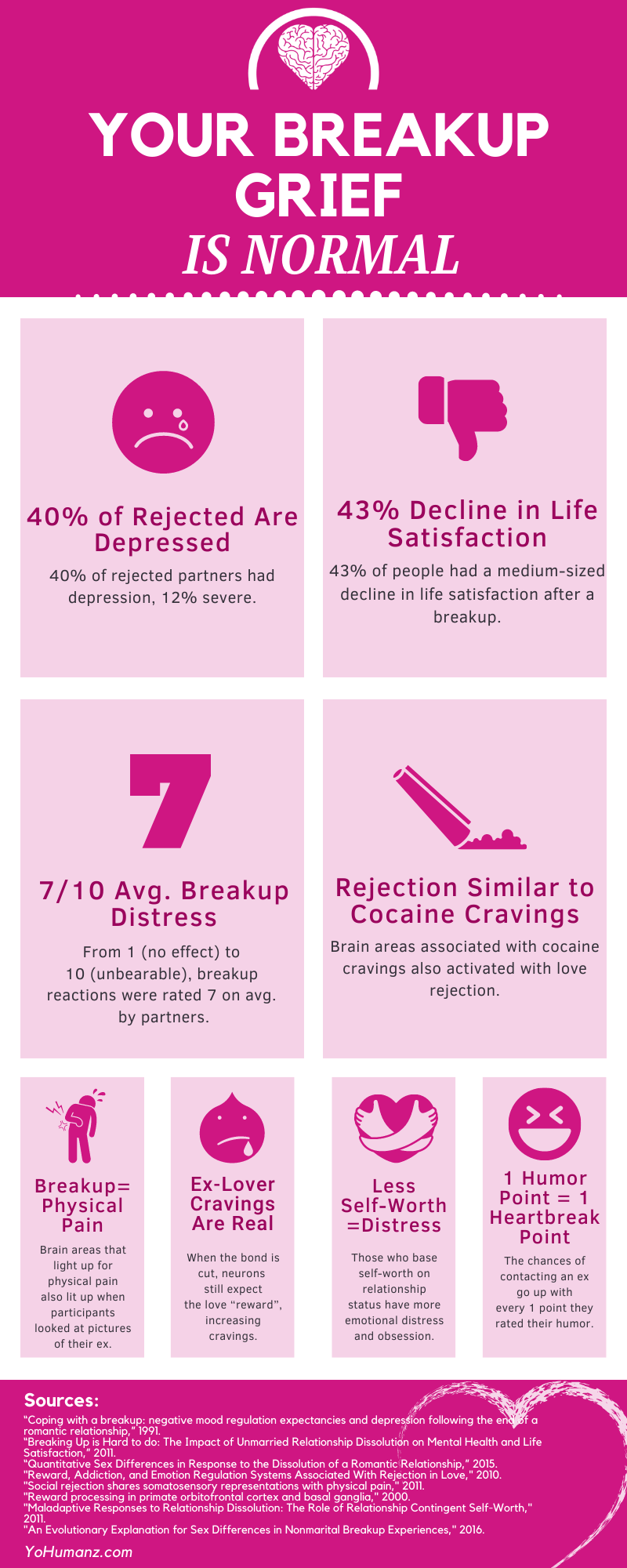When we’re going through a breakup, we might feel like we feel too much.
Like we’re alone and the only ones to go through this pain.
We know that others struggle too, but nobody seems to hurt this bad.
But the truth is, being heavily affected by your breakup is more common than you think.
If you feel depressed, like your life got worse—like it’s just about unbearable—you’re not alone.
Table of Contents
Normalizing Breakup Grief: 8 Heartbreak Facts

When you’re going through heartbreak, it can be helpful to know that breakup grief is more commonly intense than you might think. This doesn’t take away the pain. But knowing others feel similarly and get through it can give us hope.
#1 Depression is Common
How often do we feel not just sad, but depressed after a breakup? It’s easy to feel like others get over their exes quickly, but the reality is that they often don’t. In one study, 40% of college students who broke up said they were depressed. Moreover, 12% reported feeling severely depressed.
#2 Decline in Life Satisfaction is Common
Don’t you wish your breakup sadness only affected your romantic life? But it doesn’t. The breakup grief bleeds into your work life, family life, hobbies, school, etc. Sometimes, it feels like it affects everything and degrades your life as a whole.
Many people experience this alongside you. In a 2011 study, 43% of people had a medium-sized decline in life satisfaction after a breakup.
#3 Average Breakup Distress Nearing Unbearable
Have you ever had a breakup that felt so sad, horrible and hurtful that it was just about unbearable? Sometimes that can be followed by shame of how much we’re hurting. We might tell ourselves that we should have moved on, that we’re weak. That we haven’t seen anyone hurt this bad up close, so there must be something wrong with us.
But the reality is that having distress—a lot of distress—is common during breakups. Researchers surveyed close to 6,000 participants in nearly 100 countries. They asked them to rate their emotional response to breaking up. On the low end, 1 was no effect. On the high end, 10 was unbearable. For both men and women, the medium and mean response was 7 out of 10.
#4 Love Rejection Triggers Cocaine-Related Brain Areas
This was the biggest thing that normalized breakup grief for me. Studies show that areas of the brain that light up for love rejection also light up for cocaine cravings.
Yes, that means areas involved in drug addiction could explain our obsessive behaviors. Things like thinking about your ex constantly, recalling positive memories, looking at photos and stalking their social media may be functions of this brain area.
So, instead of judging ourselves for the fact we can’t stop thinking about them, let’s pause. Take a breath. And realize that you’re likely dealing with real biological changes—this is hard! Have some self-compassion.
#5 Breakup Memories Trigger Physical Pain-Related Brain Areas
Here’s more proof that your brain is going through serious changes during a breakup. In one study, researchers asked participants to look at pictures of their ex while using functional MRI. They found the same areas of the brain that light up for physical pain also light up when they looked at the photos.
So next time you feel bad when you see a picture of your ex on social media, remember that it’s normal. Your brain is triggering the same thing that physical pain does. It’s okay to feel hurt by it. Understanding these facts can help us treat ourselves a little more nicely; like we would if we were in physical distress.
#6 Ex-Lover Cravings Are Real
Do you have cravings for your ex, even if you know they aren’t good for you? Even though it logically doesn’t make sense, you can’t help but think about them or miss them.
One explanation could be that breakups involve the reward system. And your brain physically expects the love to return. When you split with someone, reward-expecting neurons are still expecting love to come back. It’s not like they understand you broke up and stop right away.
This biological expectation for reward after heartbreak should make you feel a little more normal. The cravings for your ex just aren’t in your heart—they’re in your physical brain too.
#7 Lower Self-Worth Means More Breakup Distress
Ever wonder what makes one breakup better or worse than another? Well, there’s a ton of factors. But researchers have uncovered and important one: Self-worth. A 2011 study found that those who base their self-worth on their relationship status have more emotional distress and obsession.
This intuitively makes sense. If we need to be in a relationship to feel worthy, not being in one changes our view of ourselves—leading to a ton of emotional turmoil. Next time you’re going through a rough heartbreak, ask yourself if you tied any of your self-worth to the relationship or the fact you were in one.
#8 Humorous People Are Harder to Get Over
Sometimes you might split up with someone and only experience a bit of sadness. Other times, you might be fighting with urges to text, call or “accidently” bump into them. Why? What makes one person harder to give up than another?
A 2015 study revealed that women took a longer period of time to get over their ex if they were funny. More specifically, for every 1 point of humor they rated their ex, the chances of contacting them went up.
The takeaway? Don’t date funny people; they’re just too hard to get over.
Just kidding. But don’t be too hard on yourself when you start missing your class clown.
Summary on Breakup Grief
Many of us think we should be over our breakup or divorces already. That our pain is too deep. Our healing is taking too long. That something is wrong with us. But the truth is, it’s normal to feel intensely after a breakup. Research shows that people commonly feel depressed and many rate the experience as nearing unbearable. There’s more interesting heartbreak facts too.
Not only are you not alone, but there’s biological reasons why you’re feeling so rough during heartbreak. Studies show that romantic endings can trigger areas of the brain related to cocaine cravings and physical pain.
If you’re feeling heartbroken, know that you’re not alone. It’s okay to feel deeply, even if it looks like others don’t. Treat yourself the same way you would if you were in physical pain.



